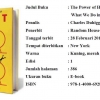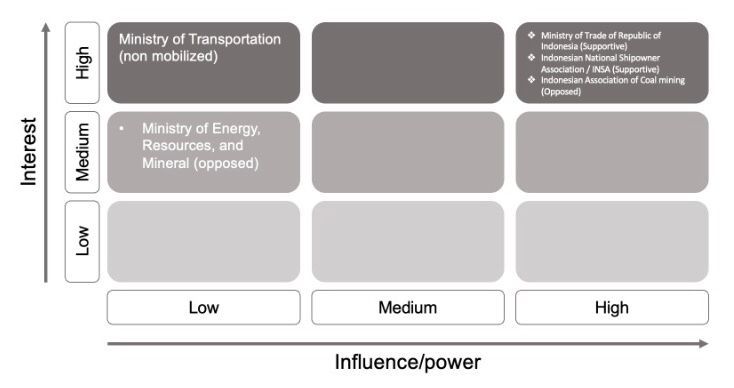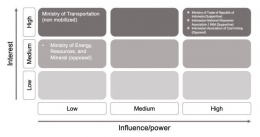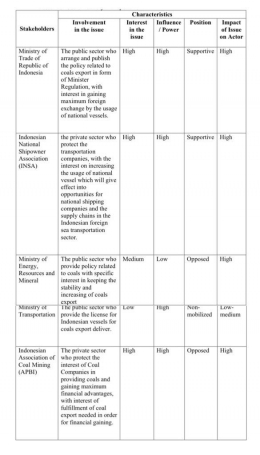By:
Rima Gravianty Baskoro, S.H., ACIArb.
Managing Partner of Rima Baskoro & Partners Law Office,
Vice General Secretary of PERADI Young Lawyers Committee,
And Co-Founder of Toma Maritime Center.
I. Background
The debates on the policy of the obligation for coal companies to use national vessel as the sea delivery transportation for coals has been raised since 2019. This policy is recognise in the form of Ministry of Trade of the Republic of Indonesia (MOT) Regulation number 82 of 2017 and has been amended with the MOT Regulation number 80 of 2018 that should be applied effectively on May 1st 2020. This Trade Minister Regulation is the derivative of the Economic Policy Package Volume XV to increase the competitiveness of the logistics industry in Indonesia. This is an interesting case for stakeholder analysis not only because involving 5 (five) stakeholders from private and public sector, but also because each stakeholders has their own perspective with strong reason that all of them are important for Indonesia and so with the background of this policy. However, the objectives of the stakeholders that against this policy is the unavailable of qualified national vessel to deliver the coals from Indonesia to the targeted countries like China and India. This facts caused disadvantage to the coals company because the national vessels unable to bring the total maximum amount of coals produced in Indonesia and needed by China and India. This analysis might potentially help in addressing the policy of obligation to use national vessel for coals delivery because it will show the position of each stakeholders with different interest and issues of this policy and strategies for managing stakeholders according to their organizational positions. This stakeholders analysis will be based on the theory framework from Zsuzsa Varvasovszky and Ruairi Brugha (2000).
II. Framework For Stakeholder Analysis
Varvasovzsky and Brugha (2000) stated that there are four steps in conducting the analysis of the stakeholders, these are: identifying and approaching stakeholders, data collection, organizing and analysing data, and presenting findings as the outputs. The aim of identifying and approaching stakeholders is to know the positions of the stakeholders. The data collection can be done through focus group discussion or informal discussion as the primary source or through literature as the secondary source. After collecting the data, then matrix, diagram, or tables will show up as the result of organizing and analysing data. Finally, such matrix, diagram or tables shown the characteristic of stakeholders.
In addition, there are three key concepts that develop and applied in this analysis. These key concepts are to identify the main stakeholders, to explore the different perspective of stakeholders on the policy, and to identify the differing expectations in the policy.
This framework and key concepts are appropriate to this case study because stakeholders analysis will contribute the approach which benefit in the analysis of interest and impact with a certain focus on policy actors. For example, by using the steps of stakeholder analysis through data collection and data analysis and organization, it can identify the main stakeholders, the different perspective of stakeholders on the policy, and identify the differing expectations in the policy. Another reason is also because stakeholder analysis targeted on the connection of groups and their concussion on policy, within a broad context like economic, political and cultural. This analysis will provide the table of stakeholder characteristics to determine about the high, middle, and low issues concerning the policy. Based on such table, it will be seen what kind of treatment shall be applied to each stakeholders. It is important to put the stakeholders into which levels of interest and power on such policy. This classification will give impact on the policy.
III. Analysis of the relevant stakeholders, their perspectives, and interests
a. Identifying Stakeholders
The aim of the stakeholder analysis is to outline the standing of stakeholders concerning the issues of the policy (Varvasovzsky and Brugha. 2000). In the policy of obligation of using national vessels for coals delivery transportation, there are at least four stakeholders from public sector and two stakeholders from private sector that has different interest. "Stakeholder" means a person, organization or groups that somehow must be considered by the leaders, front-line staff, and managers (Bryson, 2004). In public sector, there are Ministry of Trade, Ministry of Energy, Resource and Mineral, and Ministry of Transportation of the Republic of Indonesia. Meanwhile from private sector, the stakeholders are the Indonesian Association of Coal Mining (APBI) and Indonesian National Shipowner Association (INSA).
Each of stakeholders has their own role. Ministry of Trade of the Republic of Indonesia is the public sector who has the initiatives, arrange and publish the policy in form of Minister Regulation with interest in gaining maximum foreign exchange by the usage of national vessels. Meanwhile the Ministry of Energy, Resource and Mineral who provide policy related to coals has specific interest in keeping the stability and increasing of coals export. Ministry of Transportation has role in providing the license for Indonesian vessels for coals export delivery.
In addition, from private sector, National Shipowner Association (INSA) who has role as the private sector who oversees and protect the transportation companies has the interest on increasing the usage of national vessel which will give effect into opportunities for national shipping companies and the supply chains in the Indonesian foreign sea transportation sector. The other private sector stakeholders is Indonesian Association of Coal Mining (APBI) who protect the interest of Coal Companies in providing coals and gaining maximum financial advantages, who has interest in avoiding financial disadvantage as the cause of this policy.
b.Policy Debate And Perspective of Each Stakeholders
As mentioned above, all the stakeholders has their own role and interest on the policy of obligation to use national vessel as the coal delivery transportation. The perspective of each stakeholders also different from others although they might come from the same area of public sector. To obtain the data of each stakeholders' perspective, this analysis is using the secondary sources which are reports, policy statements, etc (Varvasovszky and Brugha. 2000).
The policy debates comes from the supporter versus the adversaries of this policy, but there is also the stakeholder that stands in the middle area. The stakeholders that supports this policy are Ministry of Trade and Indonesian National Shipowner Association (INSA). Ministry of Trade stated that it is important to provide a business certainty and provide sea transportation business opportunities to national sea transportation companies, as stated on the consideration of Minister of Trade Regulation number 40 of 2020. This statement is supported by National Shipowner Association (INSA) which stated by Teddy Yusaldi as the Chief of National Shipowner Association (INSA), in which he stated that if coals company keep using foreign vessels, it will cause the loss of foreign exchange potential, country revenues from taxes as well as opportunities for national shipping companies and their supply chains in the Indonesian foreign sea transportation sector, as quoted from the official website of National Shipowner Association (INSA).
As in the middle area, Minister of Energy, Resources and Mineral basically supports the coals export as the source of country's revenue. But however, Minister of Energy, Resources and Mineral also understand the policy of Government in encouraging the national shipping logistics industry. This is as stated on the official website of Indonesian Association of Coal Mining (APBI). This similar position also taken by the Minister of Transportation because they never give any comments to support or reject the policy, since they will only involve for administration matters regarding the vessels permit.
On the opposite, Indonesian Association of Coal Mining (APBI) put their vigilance in the application of the policy of the obligation of using national vessels for coals delivery transportation. This policy is potentially impact to weaken the competitiveness of national coal exports and make the investment situation even more unattractive which is counterproductive to the government's efforts to encourage a conducive investment climate.
Indonesian Association of Coal Mining (APBI) is of the opinion that the total units of qualified national vessels for coals delivery transportation is less than needed and the In terms of the age of the ship was considered inadequate. For Panamax vessels, the maximum vessel size that can traverse the Panama Canal, Indonesia only has 18 vessels and the majority of vessels are over 20 years old. Indonesian Association of Coal Mining (APBI) also stated that in 2019, there were 7,645 vessels for Indonesian coal export activities, of which is only one percent of national vessels that qualified and needed for export . This situation will cause the disturbance for coals export and this concern has happened because there are some coals export projects that is cancelled and delayed by the customers and the process transferred into other countries on May 2020.
c.Stakeholders' Expectations
Ministry of Trade hopes that there will be a collaboration between foreign vessels with Indonesian company to provide the coals delivery transportation. This is because Ministry of Trade is of the opinion that the policy does not have to use Indonesian National vessels, but the vessels that under Indonesian Transportation Company, just like a joint venture and/or merger with Indonesian company. And they were of the opinion that this is for a good intention.
As the organization that oversees companies or entrepreneurs who own national ships, National Shipowner Association (INSA) hopes that the government will also revise regulations related to taxes so that national sea transportation companies in the field of export-import transportation obtain VAT-free facilities without the need for coal transportation agreements and payments for these transportation services. In addition, it is hoped that there will be a change in the tax percentage without the obligation to have a permanent business entity. With the revision of the tax policy, the competitiveness of shipping entrepreneurs will increase and will realize the goal of having national sea transportation resilience.
Meanwhile, Minister of Energy, Resources and Mineral expect that there are still flexibility on such policy. This is important to avoid the delayed of coals delivery. In addition, they also demand for relaxation on the policy of using the national vessels on coals export delivery. This is because the limited national vessels that were available, meanwhile the needs of vessels usage were high. Moreover, coals export is one of the big foreign exchange for national income.
As the stakeholders who produce permits to the national vessel for coals delivery transportation, Ministry of Transportation does not give a clear and firm expectation. Ministry of Transportation only provide their data about the shipment of coals. Ministry of transportation stated that during 2019, the total of coals export shipment is 7.645 vessels. Meanwhile with that total amount of coals export shipment, Indonesia only used 1% of national vessel.
Indonesian Association of Coal Mining (APBI) demand for a quick and firm policy about this policy and demand the Government to publish the procedural regulation as soon as possible, so that they can inform this to Client for the sake of business in order to gain financial benefit. This is because the policy will related to the planning for vessels nomination, cooperation agreement, delivery agreement, etc. Indonesian Association of Coal Mining (APBI) also demand on the management of messy export regulation. This is because such messy export regulation will disturb the export process from Indonesia.
d. Data Analysing And Presenting Outputs
Varvasovszky and Brugha (2000) stated that tables, matrix or maps after collecting the data on policy debates and stakeholders' perspective, will be the result that can map the issue, resources and/or influence around the stakeholders, their position, and finally in what level such stakeholders can give to each. Following to those theory, below is Table 1 which consist of explanations about the stakeholders and the relation to the issue, the conflict or key elements of debate.











